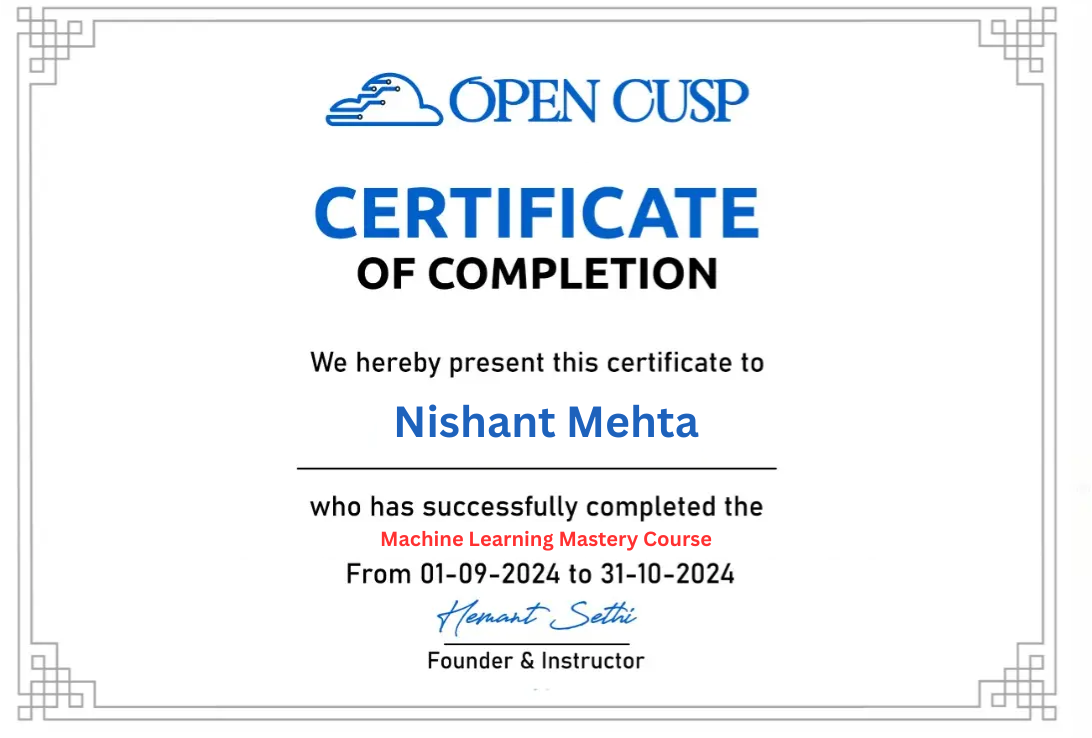What will you learn?
Learn Python, Math, and Statistics from scratch to build strong ML foundations.
Work on real-world ML projects and deploy models using scikit-learn, TensorFlow, and PyTorch.
Prepare for ML job interviews at top companies with expert guidance and mock questions.
Get real-time doubt clearing during live classes from industry-expert mentors.
Course Content for Machine Learning Mastery
- Installing Python and IDEs (VS Code, Jupyter Notebook)
- Writing your first Python script
- Understanding indentation and syntax
- Input and output operations
- Commenting code
- Declaring variables and data types
- Integer, float, and string operations
- String formatting and manipulation
- Type casting and type checking
- Creating and accessing lists
- List operations (append, remove, pop, slicing)
- Conditional statements (if, else, elif)
- Loops (for and while loops)
- Loop control (break, continue, pass)
- Defining and calling functions
- Arguments, return values, default parameters
- Dictionaries: creating, accessing, updating
- Tuples: immutable sequences
- Reading from and writing to files
- Introduction to object-oriented programming
- Creating classes and objects
- Constructors and methods
- Inheritance basics
- Try, except blocks for error handling
- Raising and creating custom exceptions
- Introduction to NumPy arrays
- Array operations and slicing
- Broadcasting concepts
- Mathematical functions on arrays
- Reading and writing arrays
- Loading datasets using Pandas
- DataFrame creation and manipulation
- Data cleaning basics (missing values, duplicates)
- Plotting graphs using Matplotlib
- Creating visualizations with Seaborn
- List comprehensions
- Dictionary comprehensions
- Set comprehensions
- Set operations (union, intersection, difference)
- Parsing and writing JSON data
- Introduction to iterators and generators
- Writing custom generators
- Understanding and creating decorators
- Understanding REST APIs
- Making API requests with requests library
- Parsing API responses (JSON/XML)
- Error handling in API calls
- Authenticating API requests (API keys, tokens)
- Setting up and configuring logging
- Writing and running unit tests with Pytest
- Validating data using Pydantic models
- Connecting Python to databases (using SQLite/MySQL)
- Executing CRUD operations
- Importing and exploring retail sales datasets
- Cleaning and preprocessing data
- Analyzing sales patterns and customer behavior
- Visualizing insights through graphs and charts
- Summarizing findings and preparing a report
- Overview of course goals and structure
- Importance of math and statistics in data science
- Real-world applications of statistical thinking
- Types of data: qualitative vs. quantitative
- Data collection and data cleaning basics
- Introduction to data visualization tools (Matplotlib, Seaborn)
- Building basic charts: bar plots, histograms, scatter plots
- Mean, median, and mode: definitions and differences
- Range, variance, and standard deviation
- Interquartile range (IQR) and boxplots
- How to interpret central tendency and variability
- Fundamentals of probability
- Independent vs. dependent events
- Conditional probability and Bayes' Theorem
- Real-world probability examples (e.g., customer churn)
- Normal distribution and its properties
- Binomial distribution
- Poisson distribution
- Understanding skewness and kurtosis
- Customer segmentation using data
- Identifying potential customer groups
- Using descriptive statistics to profile target segments
- Visualization of market demographics
- Concept and significance of CLT
- Sampling distributions explained
- Law of large numbers
- Practical implications in data analysis
- Null and alternative hypotheses
- Type I and Type II errors
- P-values and significance levels
- Conducting t-tests and z-tests
- Setting up an A/B test
- Defining control and treatment groups
- Measuring test success with metrics
- Analyzing A/B test results and drawing conclusion
- What is Machine Learning?
- Types of Machine Learning: Supervised, Unsupervised, Reinforcement
- ML vs Traditional Programming
- Key concepts: Features, Labels, Models, Training, Prediction
- Introduction to popular ML libraries (Scikit-learn, TensorFlow)
- Understanding regression problems
- Simple Linear Regression
- Multiple Linear Regression
- Polynomial Regression
- Regularization techniques: Ridge, Lasso, ElasticNet
- Evaluation metrics: MAE, MSE, RMSE, R² score
- Understanding classification problems
- Logistic Regression
- Decision Trees
- K-Nearest Neighbors (KNN)
- Support Vector Machines (SVM)
- Naive Bayes
- Evaluation metrics: Accuracy, Precision, Recall, F1 Score, Confusion Matrix
- Concept of ensemble methods
- Bagging: Random Forest
- Boosting: AdaBoost, Gradient Boosting, XGBoost
- Stacking and Voting Classifiers
- Advantages and disadvantages of ensemble methods
- Train/Test Split and Cross-Validation
- Bias-Variance Tradeoff
- Hyperparameter tuning (Grid Search, Random Search)
- Overfitting and Underfitting
- ROC Curve and AUC Score
- Problem definition
- Data collection and exploration
- Data preprocessing and cleaning
- Feature engineering and selection
- Model building and evaluation
- Model deployment and monitoring
- Handling missing data
- Encoding categorical variables
- Feature scaling: normalization and standardization
- Feature selection techniques
- Creating new features from existing data
- What is Unsupervised Learning?
- Clustering: K-Means, Hierarchical Clustering, DBSCAN
- Dimensionality Reduction: PCA, t-SNE
- Applications of clustering and reduction techniques
- Evaluating unsupervised models (silhouette score, etc.)
- Understanding the housing dataset
- Exploratory Data Analysis (EDA)
- Data cleaning and preprocessing
- Building and evaluating a regression model
- Interpreting the results and drawing business insight
- Introduction to MLOps concepts
- Model versioning and reproducibility
- Deployment strategies (batch vs real-time predictions)
- Using cloud platforms: AWS SageMaker, Azure ML, GCP AI Platform
- Monitoring and retraining models in production
Requirements
Everything You Need to Get Started:No technical background required – we teach you Python, Math, and Machine Learning step-by-step from zero.
All you need is a passion to learn and a dream to build real-world Machine Learning projects.
With expert mentorship and daily practice, you’ll transform into an industry-ready ML engineer.
Meet your instructor


Mr. Hitesh Gudwani
AI Expert | 20+ Years of Experience in ML, DL, NLP & Generative AIHitesh is an experienced AI professional specializing in Machine Learning, Deep Learning, Natural Language Processing, and Generative AI. With a passion for teaching, he makes complex AI topics simple and practical. Hitesh empowers learners to build real-world AI solutions and succeed in the fast-growing field of artificial intelligence.

Buy for 10% off
This course include:
45+ hours of live Machine Learning classes covering Python, Math, and core ML concepts.
Direct mentorship from industry experts working at top tech companies.
Lifetime access to class recordings, notes, and learning materials.
Real-world ML projects to help you build a strong, job-ready portfolio.

